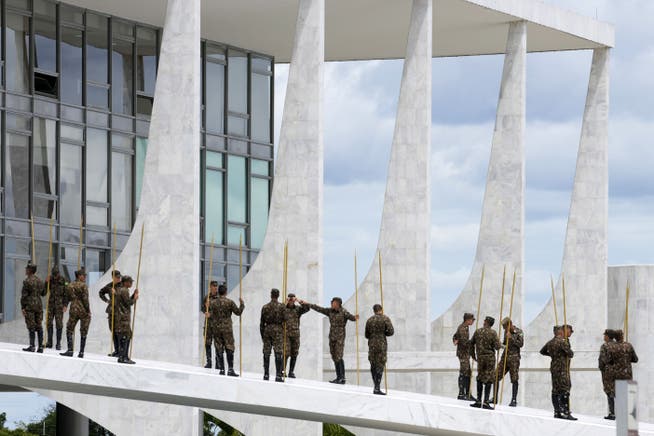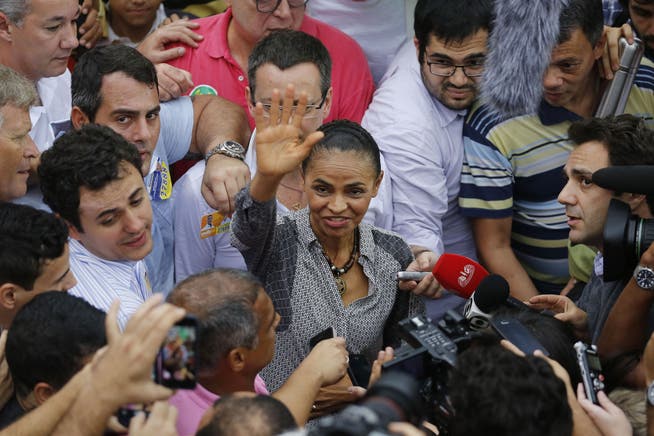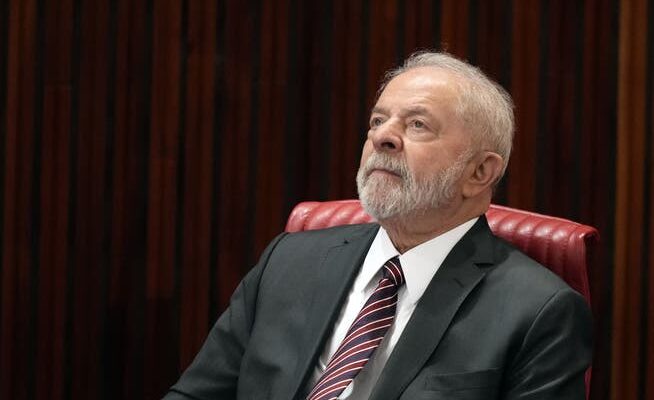On New Year’s Day, the 77-year-old will assume Brazil’s highest political office. But the security situation in the country is fragile. Until the very end, Lula had to advertise for political alliances by awarding posts. His predecessor is silent – and will skip the handover.
The economic prospects are gloomy, the supporters of his predecessor are sometimes violent and the political majorities in parliament are complicated. The challenges for Brazil’s new president are great.
In the days leading up to the change of government, the atmosphere in the capital, Brasilia, is tense. After violent protests and a failed bomb attack on a kerosene tanker by supporters of President Jair Bolsonaro, concerns are growing that violent incidents could also occur on January 1, the day when Luiz Inácio Lula da Silva took office.
Bolsonaro supporters are still demonstrating in front of the army headquarters in Brasilia against the transfer of power. They consider the elections to be fraudulent and call for the military to intervene. The bomb attack was also prepared in the vicinity of these protester camps. An extensive arsenal of weapons was also secured in the apartment of the failed bomber.
Federal police therefore strongly advise Lula not to drive through Brasilia in an open car, as is customary for presidents when they take office. Instead, he is said to be traveling in an armored vehicle.
It is still unclear whether the military will guarantee security
It is also not yet clear who will be responsible for security during the handover. The military, whose three branches of service play an important role during the ceremony, are leaderless. Actually, the army and navy generals behind ex-Captain Bolsonaro wanted to resign from their posts before Lula became their commander-in-chief as president. But these resignations could be interpreted as insubordination and could result in punishment by military justice. It is now unclear which generals from the army, navy and air force are still in office on January 1 and which are not.
This is problematic for security on New Year’s Day. Because it remains vague how strongly the Bolsonaro supporters are supported by the military in front of the garrisons throughout Brazil. As a civilian, the designated Defense Minister José Múcio Monteiro now faces the difficult task of confining the army, which also became politically influential under Bolsonaro, to its defense tasks again.
The still President Bolsonaro is silent on the events. Since the election defeat on October 30, he has not given any indication that he has a political strategy for the future. What is certain is that he will not be present at the handover. In order to avoid the traditional presentation of the presidential sash, he traveled to the United States on Friday. On Friday evening he landed in Orlando, Florida. It is said that he wants to stay in the USA until February. Bolsonaro’s vice president and reserve general Hamilton Mourão also refused to attend the ceremony.

Soldiers practice in Brasilia for the inauguration ceremony.
Victory was easier than forming a cabinet
While the security situation remains fragile, intensive negotiations on the formation of the new government are ongoing in Brasilia. It’s easier to win an election than to put together a cabinet, President-elect Lula recently moaned. For two months he has been almost exclusively occupied with the selection of personnel for his cabinet. There are also other key positions in state-owned companies and authorities as well as the second hierarchical level in politics and administration. He has already selected 37 ministers. For the first time, with 11 women ministers, around a third of the cabinet positions are occupied by women.
Until shortly before taking office, however, Lula was still negotiating who he should put at the top of important ministries such as mining and energy, infrastructure or agriculture. Departments such as fishing or tourism also remained vacant until the very end. The reason for the negotiation marathon: Lula’s Labor Party and the Left do not have a majority of votes in Congress. He must therefore involve as many representatives of the center-right parties as possible in a coalition. In Brazil, this is traditionally done with item or budget allocations.
At the same time, however, Lula has to save important posts for his Labor Party – and rein in its escalating claims to influential positions so as not to alienate potential allies. For example, Lula has relied on close, long-term confidants in defense, the judiciary, finance and the State Department.
This allows him to get the government machine up and running as quickly as possible. Another positive factor is that Lula used mainly experienced politicians and no left-wing ideologues. Many of them have been re-elected as governors, representatives or senators. This means that they have more political legitimacy at the top of the ministries than would party officials or technocrats.
The economy remains skeptical
The environment department is likely to play a key role in Lula’s government. His former Environment Minister Marina Silva will take over the portfolio again. After the disaster under Bolsonaro, Lula wants to revise Brazil’s battered reputation as a rainforest destroyer and climate sinner with a new environmental and Amazon policy.

Marina Silva, seen here during an election campaign in a Rio de Janeiro slum in 2014, was environment minister in Lula’s last government.
The new Foreign Minister Mauro Vieira has a similarly important position: the experienced diplomat is to end Brazil’s isolation in world politics and enhance the country’s geopolitical role – as in Lula’s first terms of office between 2003 and 2010. He is also to strengthen contacts with Europe, the revitalize the US and China.
Meanwhile, the economy is concerned about the announcements about future budgetary and economic policies. Lula had already approved massive increases in government spending before taking office. In addition, the new president wants to enforce a shorter lock-up period for old politicians in state-related companies in order to use confidants there. These are supposed to push forward an industrial policy that failed miserably under the four governments of his Labor Party due to poor government decisions and gigantic corruption.
The chief economist at the investment bank Itau, Mario Mesquita, therefore fears that the sharp increase in government spending will trigger another cycle of low growth, high inflation and high interest rates. The forecasts are gloomy: the economy will hardly grow in 2023 and inflation will remain above 5 percent. The central bank will probably not be able to lower the high key interest rate of 13.75 percent next year, if at all.
Tailwind from abroad?
Lula knows full well that economic developments over the next few months will be crucial to the success of his government. In order to placate investors, he has now appointed two conservative ministers to head the departments of planning, industry, economic development and trade, alongside his close confidante Fernando Haddad as finance minister.
As in 2003, his government could benefit from developments in the global economy and the leap of faith of foreign investors. While Brazilian business leaders reacted with disappointment to the initial announcements, foreign companies and investors continued to invest in Brazil following Lula’s election.
In addition, the end of the zero-Covid policy in China could push up global commodity prices. Since mid-November, the prices for some raw materials for which Brazil is an important supplier on the world market have risen significantly: This applies to soya and iron ore, but also to orange juice, sugar and coffee. Brazil’s economy could therefore also benefit from tailwinds from the global commodity markets in 2023.
This growth spurt from abroad could have a decisive impact on Lula’s ability to govern given the tense domestic political situation.
